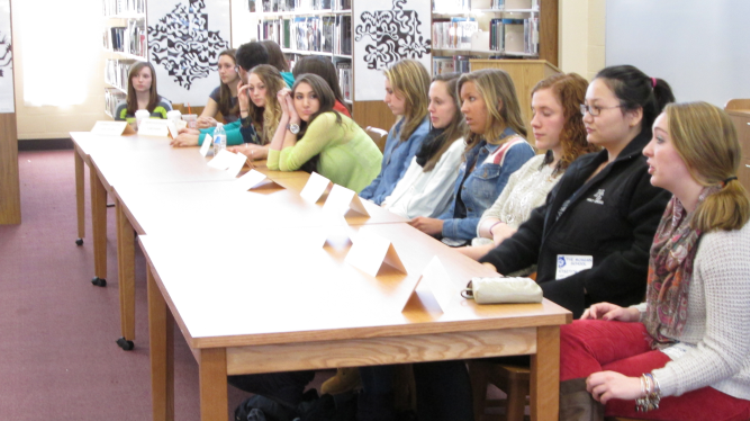Written by Emma Wentworth and Mary Muratori|
Pictures by Emma Wentworth|
Presenters included: Tsering Lhamo, Emily Perzanoski, Kelly Roche, Sadie DeFlippo, Caitlin McDonough, Lauren Gervais, Casey Marsh, Kaitlyn Elliot, Christy Coyne, Jeffrey Norton, Sarah Stearns, Stephanie Strucaly, and Jillian Riter.
On January 4th, 13 freshmen college students who graduated from Morgan returned to enlighten some seniors and juniors about college life. Since the students were from different colleges, they shared various perspectives on college life. The colleges represented were University of Delaware, University of Pittsburgh, Eastern, Avery Point/Uconn and Keene State.
Each college seems to have an orientation program that the students recommended attending to help build relationships and to learn how to get around the campus. All students felt orientation was helpful because it made their transition easier into a whole new world. Some transitions were easier than others, they said, especially the students who stayed close to home. “Transition was a little bit harder than I thought just because of the fact it was harder for me to visit home when I wanted,” said Steph Strucally from Pitt University.
Roommates can either make the transition expirience easier or harder. In Sadie DeFlippo’s case, her first roomate left, leaving her alone for a few months before a stubborn new roommate moved in. This made her transition very difficult. In Emily Perzanoski’s case, she is best friend’s with her roommates!
The students explained that college is all about time management: You’re given so much freedom that you need to plan your free time and your time for homework. Teachers don’t tell you your homework or write it on the board; the due dates are placed on a syllabus which is given to you the first day of class or online. Some students, like Katie Eliot, also have to manage time with activities such as club soccer. All students recommend asking for help when needed; there are many options for help such as visiting the teacher, tutors, or study groups.
A big topic was partying. Most of the underclassmen wondered how college partying was different from high school partying. Most colleges are big party schools with the exception of a few dry campuses such as Eastern. With partying comes a big responsibility: “You need to always know where you are, make sure you have a safe ride back to your dorm, never take drinks from a stranger and always have a buddy/group which you can trust. This doesn’t mean to go and party whenever you want.” Each school has its own punishment with some worse than others. Emily Perzanoski said American University had a rule if you cannot walk or speak an ambulance is called to bring you to the nearest hospital, and your parents are billed $800. “This is both socially embarrassing and financially detrimental,” she said.
This panel really helped seniors and juniors understand how the transition works and the fact that they can not predict anything about college.
[wpvideo rnTrCpEA]


